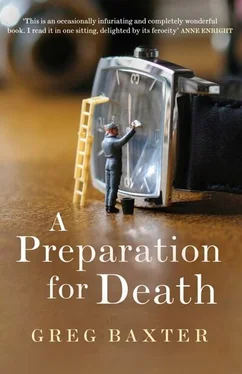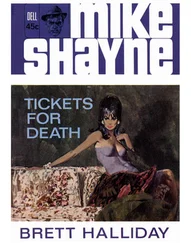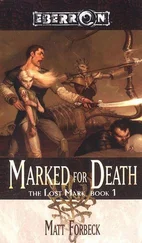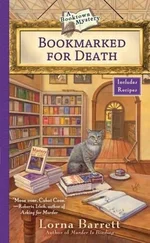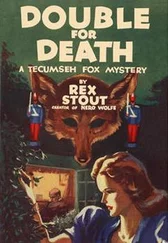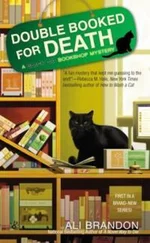Elísabet and I have spent hours interpreting the picture. She says Maria’s cardigan reminds her of the bricks at Auschwitz. She wants this chapter to begin: My grandmother’s cardigan reminds me of the bricks at Auschwitz . I fear that I am not suited to that kind of writing.
After the war, the story becomes more coherent. Maria got work at a US Air Force base outside Vienna. I can’t recall what her job was, though she told me on a few occasions. One day she was invited to eat breakfast with some of the officers — she was still very beautiful — and she broke down and wept at the sight of bread and jam. When she told them she could not eat something so extravagant when her children were starving — my father was suffering from rickets — they began to send her home with baskets of food. It is the only episode she tells from her entire life that makes her wistful.
In 1947 she received a letter from an American officer she’d met when he’d worked at the base, Jim Baxter, asking her to come to Oklahoma and marry him. There was a picture of him in the letter. He mentioned his love for her, which had grown since they parted. He mentioned his job and stability. Her family convinced her there was nothing in Austria — no money or food, no men. She moved to Oklahoma and married Jim; shortly after that they relocated to Texas — the Alamo Heights district of San Antonio. Jim adopted my father and Peter, and they took his surname.
Jim and Maria had a child together, Jim Jr — Fielding’s father. They divorced in the early 1980s: Jim, then in his sixties, left Maria for a 33-year-old. Though I called him Opa (as I called Maria Oma ), and he raised my father, I have no memory of him. I must have been around him quite a bit as a child, but I never noticed.
Maria was unfazed by the divorce. She had never loved him, she explained. She was merely loyal and regretless. Many years later she would admit that her trepidation in emigrating came not just from leaving Austria — she was a patriot — but because she hardly even remembered Jim Baxter.
A few years after the divorce, Maria began working as a nurse for a woman with Alzheimer’s outside the town of Boerne, about thirty miles north of San Antonio, where the Texas Hill Country begins. When the woman died, her husband, Bob Wallace, a rich attorney with a big white Cadillac and a big red Cadillac, proposed that, since they were old anyway, and he had some money, and would like to travel in Europe with a companion, they ought to get married. She agreed — the prospect of annual trips to Austria sold her. There was no ceremony I knew of, or if there was, no children were invited. Bob hated children. He could not tolerate irrationality. During meals he sat us around a humiliatingly small table, far away from the adults. Yet he had childlike fascinations and habits. He kept loaded guns all over his house and refused to move them, even though the idea that some marauder would be targeting his house was ludicrous. He was a ham radio operator. He was learning, at the age of eighty, computer programming, and obsessively played a golf game on his PC; he allowed me to play with him, and the fact that I always won was incomprehensible to him, and humorous. He seemed emotionless, and yet he used to cry at the sound of classical music. I interviewed him once for a high-school project, and realized he was the most interesting person I had ever known. The tape of that interview is lost, and I’ve forgotten everything he said, everything but this: once, when he was poor and starving, during the Depression, he had cleaned himself up, walked into a diner and ordered two large steaks. When it came time to pay the bill, Bob told the owner he had no money at all, but he’d work for his food. The man threatened to call the police, and Bob argued that he’d never get his money that way. He got a job as a dishwasher, then a cook. A few years later he was the lead attorney in Texas for FDR’s Civilian Conservation Corps.
I sit here, at the dining-room table, beside the picture of Maria, waiting for this memory to spark others. Something comes back: I remember sitting in the room with him, checking the tape to make sure it was running. Flipping it when it stopped.
His house was situated at the top of a tall hill, and he owned the whole hill, down to little streams and thick woods that surrounded it, which was unused land for the most part. He had a salt lick and used to sprinkle dry kernels of corn all around his yard, and mobs of deer used to migrate through the space while we watched from the back patio. They would stop and eat everything, and we had to be absolutely quiet or they would spook and trample away. My father and Bob spent a lot of time chipping golf balls around. Bob argued with other men about politics and philosophy and religion, and whether he was right or not, he always won the arguments. Nobody could keep up, or wanted to. He was a devout atheist — unlike my father, who was a private and disinterested atheist. He called black people niggers and did not understand why they wanted to be called anything else — and by anything else (this dates him rather severely) he meant coloured . When lots of grandchildren visited, the boys played war in the woods, and the girls did indoor things. Maria often wore a dirndl and baked. We had transplanted the Aryan dream to the Texas Hill Country.
I spent a lot of time at that house by myself. Because I cared the most about my Austrian heritage, I was the favoured grandson. I slept in a big bed in one of the large guest bedrooms. In the daytime it was fine, but at night the ceiling filled with tiny scorpions that cast great vampiric shadows in the lamplight. I wrapped myself up to my neck in a blanket and slept like a plank of wood. I told Bob he had scorpions in his house and he looked at me very much like I expected him to.
At the age of eighty-five, Bob suddenly became sick: emphysema and a dozen other illnesses. His mind was still fierce — he remembered everything that ever happened; he wanted to get out and exert the influence of his mind on the world — but he could not control when he went to the bathroom, couldn’t walk on his own, could barely breathe and depended on an oxygen mask. His condition transformed Maria from a wife to a nurse. One day he sent her out for groceries and took his army issue.44 and blew his brains out. She found his body, which she never described. He was the first person I ever personally knew who died. A few days later I telephoned her and asked how she was. I’m fine, she said, how are you?
A few days ago I was virtually alone on the Dart from my part of town to the city. After a few dry weeks, Dublin had finally come alive in the rain. No city in the world transforms in rain like Dublin. In the sunshine it is hard-edged and ugly and rank. In the rain it softens like a sponge, swelling, and all the open spaces narrow. The train passed out of the trees and suburbs and graffiti, where it rises over the houses slightly, above Clontarf, and the whole grey city was like a swamp floating in the bronze light of an overcast sunset, twinkling and shimmery building tops, rays of heavy rain slamming onto certain streets, this one and that one, and the bay, settled, chopless, paralysed. Above it, great blue-black clouds like Zeppelins rumbled hulkingly toward the city. It seemed like an invasion. An overweight woman with nice black hair, my age, sat a few seats ahead of me in a woolly black coat, reading a magazine. Another guy, handsome, in his twenties, on the telephone ahead of her, was talking to a girl. He was being very smooth. The train began to decelerate as we approached Connolly Station. The view of the bay was lost, and the high vantage, and so was the curious sense, which strikes from time to time, that I was not me but Herbert, suddenly alive after sixty-five years, but with no memory and no acquaintances. I stood and waited by the doors. The rain became so heavy, all at once, that the city disappeared completely.
Читать дальше
